CHAIRMAN HEC, URGES SIGNIFICANT ROLE OF YOUTH IN DEVELOPMENT OF SOCIETY
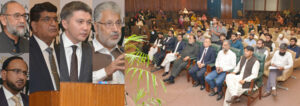 Chairman Higher Education Commission (HEC), Dr. Mukhtar Ahmed, addressing the closing ceremony of a two-day peace conference organized by the Islamic Research Institute of the International Islamic University Islamabad has said that Islam is a religion of peace and tolerance, and that social and societal reconstruction requires time and cooperation to solve Pakistan’s problems. Addressing the conference participants, Chairman HEC lauded the efforts of the organizers and hoped that the conference would bring practical and research-based recommendations to solve challenges.
Chairman Higher Education Commission (HEC), Dr. Mukhtar Ahmed, addressing the closing ceremony of a two-day peace conference organized by the Islamic Research Institute of the International Islamic University Islamabad has said that Islam is a religion of peace and tolerance, and that social and societal reconstruction requires time and cooperation to solve Pakistan’s problems. Addressing the conference participants, Chairman HEC lauded the efforts of the organizers and hoped that the conference would bring practical and research-based recommendations to solve challenges.
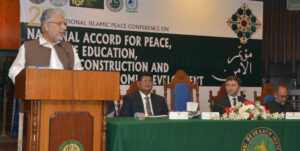 Dr. Mukhtar Ahmed highlighted the significant role of youth in the development of society, stressing the importance of cleansing society from hate, hatred, and intolerance. He stated that education diplomacy is practical for solving such problems in society, and education is the best tool to solve all the problems of the society. Dr. Ahmed called for all educational institutions to focus on the training of youth, emphasizing that our homes are the primary training schools of our children.
Dr. Mukhtar Ahmed highlighted the significant role of youth in the development of society, stressing the importance of cleansing society from hate, hatred, and intolerance. He stated that education diplomacy is practical for solving such problems in society, and education is the best tool to solve all the problems of the society. Dr. Ahmed called for all educational institutions to focus on the training of youth, emphasizing that our homes are the primary training schools of our children.
The conference was also addressed by Ambassador of Kazakhstan, H.E. Yerzhan Kistafin who was Guest of Honour in the conference. Addressing conference participants, the Ambassador of Kazakhstan lauded the efforts of IIUI for mainstream Islamic teachings to all over the world. He said that the government of Kazakhstan is willing for collaboration between IIUI and universities of Kazakhstan as well as other universities in Pakistan, so that his country’s institutions would be able to send Kazakhstani students to IIUI for the study of Islamic teachings and in other universities as well in different disciplines. The Ambassador of Kazakhstan also encouraged efforts of Islamic Research Institute, IRI, IIUI for dissemination of the message of peace through the national narrative “Paigham e Pakistan” across the world.
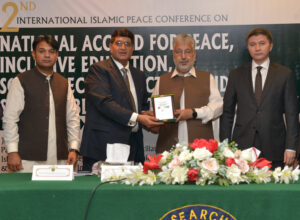
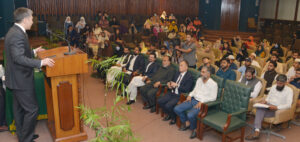 During the two days conference, more than 60 presentations by scholars were presented in sessions, including six sessions in Urdu, Arabic, and English by scholars from various fields and institutions of Pakistan. Panel discussion sessions and conferences on various topics like peace for sustainable economic development were discussed. The conference emphasized the importance of creating a stable, secure, and prosperous environment to move Pakistan towards a geo-economics approach, promoting regional integration and sustainable development.
During the two days conference, more than 60 presentations by scholars were presented in sessions, including six sessions in Urdu, Arabic, and English by scholars from various fields and institutions of Pakistan. Panel discussion sessions and conferences on various topics like peace for sustainable economic development were discussed. The conference emphasized the importance of creating a stable, secure, and prosperous environment to move Pakistan towards a geo-economics approach, promoting regional integration and sustainable development.
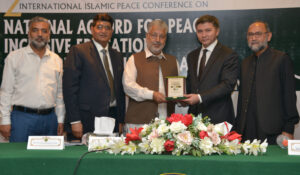 The conference recommended that a national accord is necessary to achieve political and economic stability in the country, and condemned all trends of terrorism, extremism, sectarianism, incitement to violence, and hate speech in any shape or form. It was agreed that conferences on peace and national agreements should continue and should be organized in collaboration with other universities and institutions in different regions of Pakistan.
The conference recommended that a national accord is necessary to achieve political and economic stability in the country, and condemned all trends of terrorism, extremism, sectarianism, incitement to violence, and hate speech in any shape or form. It was agreed that conferences on peace and national agreements should continue and should be organized in collaboration with other universities and institutions in different regions of Pakistan.
The conference recommended that state and society must work together to find lasting solutions to violence, deliver justice, fight corruption, and ensure inclusive participation. National and local institutions must be accountable and have their own to deliver basic services to communities equitably. The media and society should play their constructive role in maintaining peace and protecting the rights given in Islamic teachings and the provisions of the Constitution of the Islamic Republic of Pakistan.
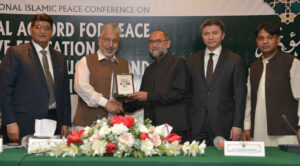 In conclusion, the conference emphasized the importance of diversity and dialogue within the framework of the rule of law, promoting and exemplifying mutual respect and understanding in society, facilitating and exemplifying intercultural dialogue, and combating misinformation, negative stereotypes, and stigma. The conference recommended that state institutions such as the Islamic Research Institute, the International Islamic University, and the Council of Islamic Ideology should continue to play an important role in peacebuilding and social reconstruction.
In conclusion, the conference emphasized the importance of diversity and dialogue within the framework of the rule of law, promoting and exemplifying mutual respect and understanding in society, facilitating and exemplifying intercultural dialogue, and combating misinformation, negative stereotypes, and stigma. The conference recommended that state institutions such as the Islamic Research Institute, the International Islamic University, and the Council of Islamic Ideology should continue to play an important role in peacebuilding and social reconstruction.
Earlier, a panel discussion was held before the closing session in which panelists discussed in detail various questions regarding intolerance, extremism, and ways to stop such and in the end a question answer session was held after the discussion. Panelists include Prof. Dr. Mustafeez Ahmad Alvi, NUML, Islamabad, Prof. Dr. Abdul Quddus Suhaib, BZU, Multan, Prof. Dr. Mohyuddin Hashmi, AIOU, Islamabad, Dr Amir Tuaseen, Chairman, Majlis-e-Ilmi Foundation, Karachi, Prof. Musferah Mehfooz, COMSATS University Islamabad, Lahore Campus, Lahore, Prof. Monazza Hayat, BZU, Multan, Prof. Muhammad Tayyeb Nadeem, National University of Computer & Emerging Sciences, Islamabad and Sahibzada Muhammad Qamar Ul Haq, Jamia Muhammadi Sharif, Chiniot.
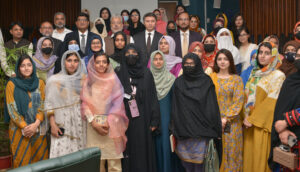 Prof. Dr. Muhammad Zia-ul-Haq, Director General (IRI) IIUI apprised of the objectives of the conference which was jointly organized by Paigham-e-Pakistan, Center for Peace, Reconciliation & Reconstruction Studies Islamic Research Institute (IRI) & International Islamic Institute for Peace (IIIP), Islamabad. He discussed in detail the theme of the conference and objectives of the conference in the light of national narrative. He added that the declaration would be endorsed by the Vice Chancellors of the universities in a forum while it would also be endorsed by the Ulema of Pakistan and after a narrative would further be endorsed by the government of Pakistan.
Prof. Dr. Muhammad Zia-ul-Haq, Director General (IRI) IIUI apprised of the objectives of the conference which was jointly organized by Paigham-e-Pakistan, Center for Peace, Reconciliation & Reconstruction Studies Islamic Research Institute (IRI) & International Islamic Institute for Peace (IIIP), Islamabad. He discussed in detail the theme of the conference and objectives of the conference in the light of national narrative. He added that the declaration would be endorsed by the Vice Chancellors of the universities in a forum while it would also be endorsed by the Ulema of Pakistan and after a narrative would further be endorsed by the government of Pakistan.
Dr. Zia also presented the recommendations of the conference on this occasion. He said this conference and accord is an initiative of honorable Minister Ahsan Iqbal and IRI that is indeed a new step to take Paigham-e-Pakistan the national narrative to the new destinations. He also elaborated that the conference is based on themes of national challenges, Pakistan’s response towards challenges and way forward. He thanked Prof. Dr. Mukhatar, Chairman HEC, Pakistan, guests and speakers and at the end of the conference, commemorative souvenirs presented to the guests as well.

